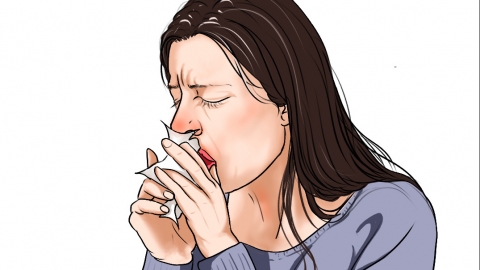What to do about dry cough without phlegm in bronchitis
Generally, dry cough without phlegm in bronchitis may be caused by environmental factors, hyperventilation, asthma, gastroesophageal reflux disease (GERD), heart failure, and other factors. It is recommended to seek timely medical consultation to identify the underlying cause and proceed with appropriate treatment, including general management and medication, under the guidance of a qualified physician. Detailed analysis is as follows:
1. Environmental Factors
Stimulants in the air, such as dust, smoke, pollen, etc., may increase airway sensitivity. When irritants are inhaled, the bronchial mucosa becomes irritated and may develop a localized inflammatory response, manifesting as dry cough without phlegm in bronchitis. This may be accompanied by allergic symptoms like sore throat, nasal congestion, and sneezing. It is recommended to reduce exposure to irritants, use air purifiers, and maintain fresh indoor air.
2. Hyperventilation
During vigorous exercise or emotional excitement, breathing rate increases, potentially causing airway dryness and irritation, leading to dry cough without phlegm in bronchitis. Symptoms may include palpitations, sweating, and chest tightness. It is recommended to avoid hyperventilation, manage emotions, and maintain a proper breathing rhythm.

3. Asthma
Asthma is a chronic nonspecific inflammatory disease of the airways involving multiple cells and cellular components. In asthma, allergic inflammation occurs in the airways, with mucosal edema, smooth muscle spasm, and airway narrowing, resulting in dry cough without phlegm in bronchitis. Symptoms may include wheezing, difficulty breathing, and worsening cough at night. Follow medical advice to use medications such as budesonide inhalation aerosol, salbutamol sulfate tablets, and ipratropium bromide aerosol to control airway inflammation and hyperresponsiveness.
4. Gastroesophageal Reflux Disease (GERD)
In GERD, stomach acid and digestive juices reflux into the esophagus and may even enter the airways, irritating the airway mucosa and causing dry cough without phlegm in bronchitis. Symptoms may include retrosternal burning sensation, acid regurgitation, and belching. It is recommended to use medications such as omeprazole enteric-coated capsules, ranitidine tablets, and domperidone tablets to promote gastric emptying and reduce reflux.
5. Heart Failure
In heart failure, weakened myocardial contraction leads to excessive venous congestion in the periphery, reduced cardiac output, and insufficient blood supply to meet the needs of tissues and organs. This may cause pulmonary edema, irritating the airway mucosa and resulting in dry cough without phlegm. Symptoms may include dyspnea, palpitations, and lower limb edema. It is recommended to use medications such as furosemide tablets, enalapril maleate tablets, and digoxin tablets to enhance myocardial contractility and improve cardiac function.
When treating dry cough without phlegm in bronchitis, it is important to choose an appropriate treatment based on individual conditions. Additionally, maintaining healthy lifestyle habits and a positive mindset is recommended.




